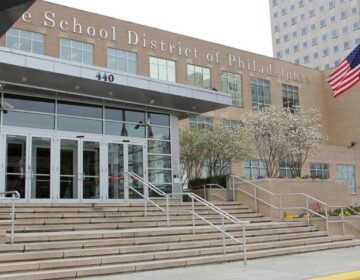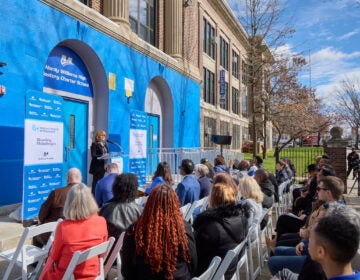Philly teachers overwhelmingly approve new contract
-
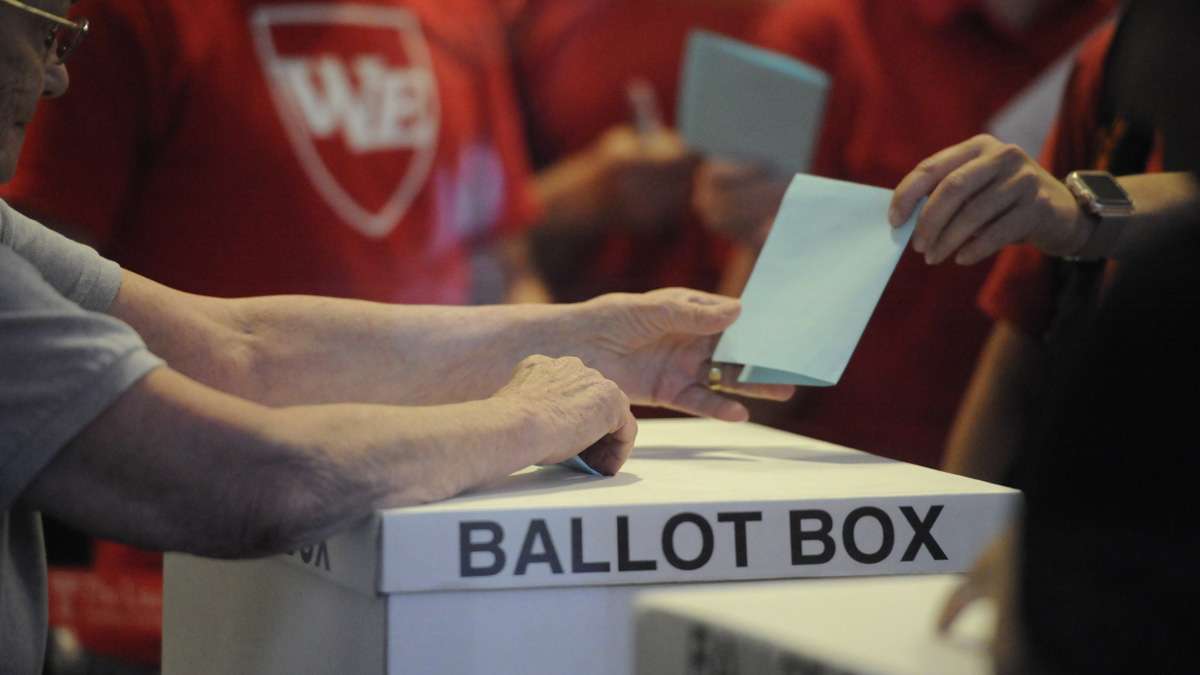
A member of the Philadelphia teachers union hands in a ballot Monday night at Temple University's Liacouras Center as the Philadelphia Federation of Teachers voted on a contract proposal. The plan that runs through 2020 won overwhelmingly. (Jonathan Wilson for WHYY)
-
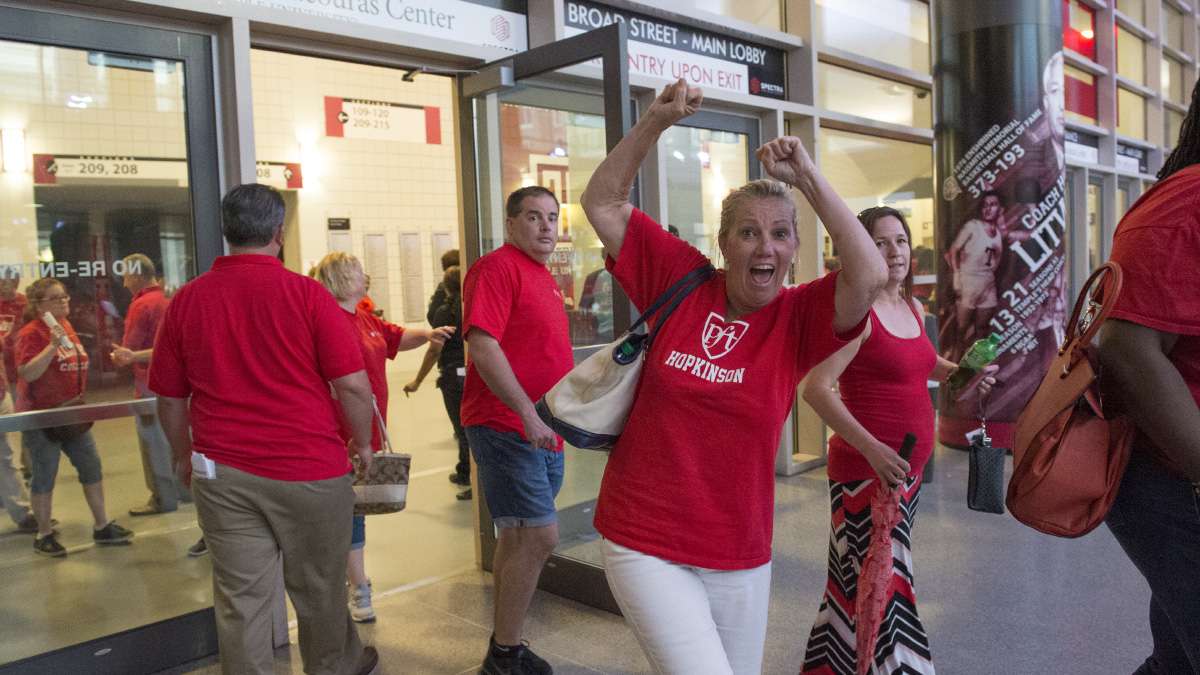
An ecstatic PFT member leaves the Liacouras Center at the conclusion of the vote. (Jonathan Wilson for WHYY)
-
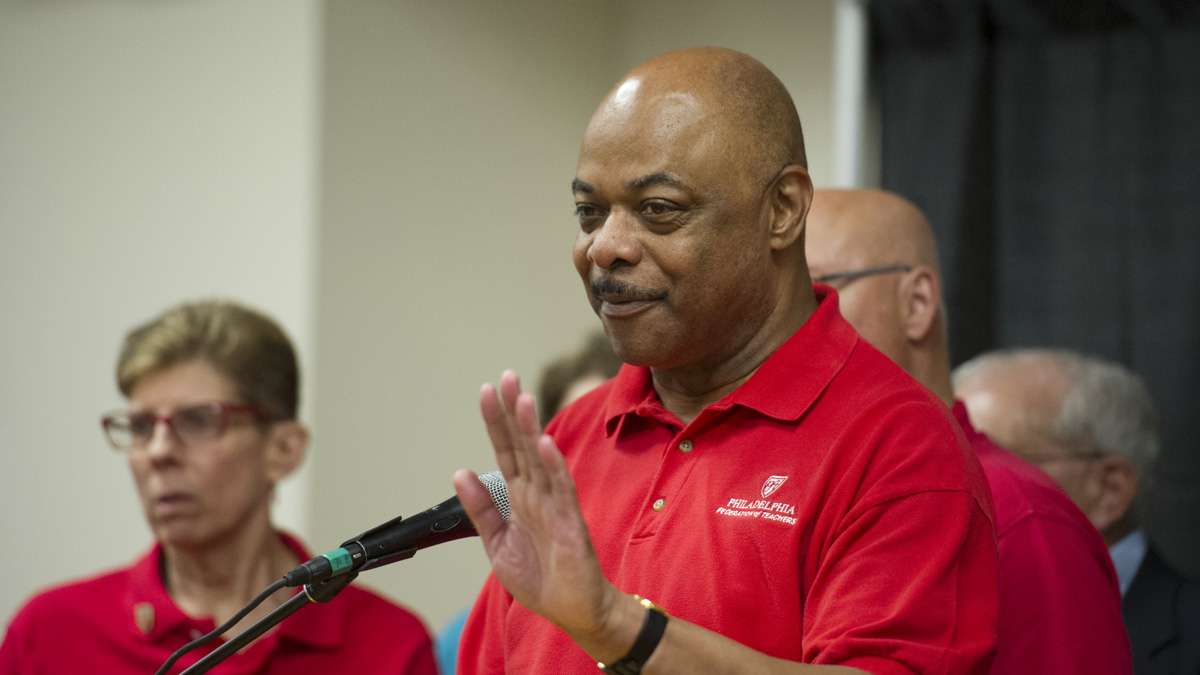
Philadelphia Federation of Teachers president Jerry Jordan speaks to the press in 2017. (Jonathan Wilson for WHYY)
-
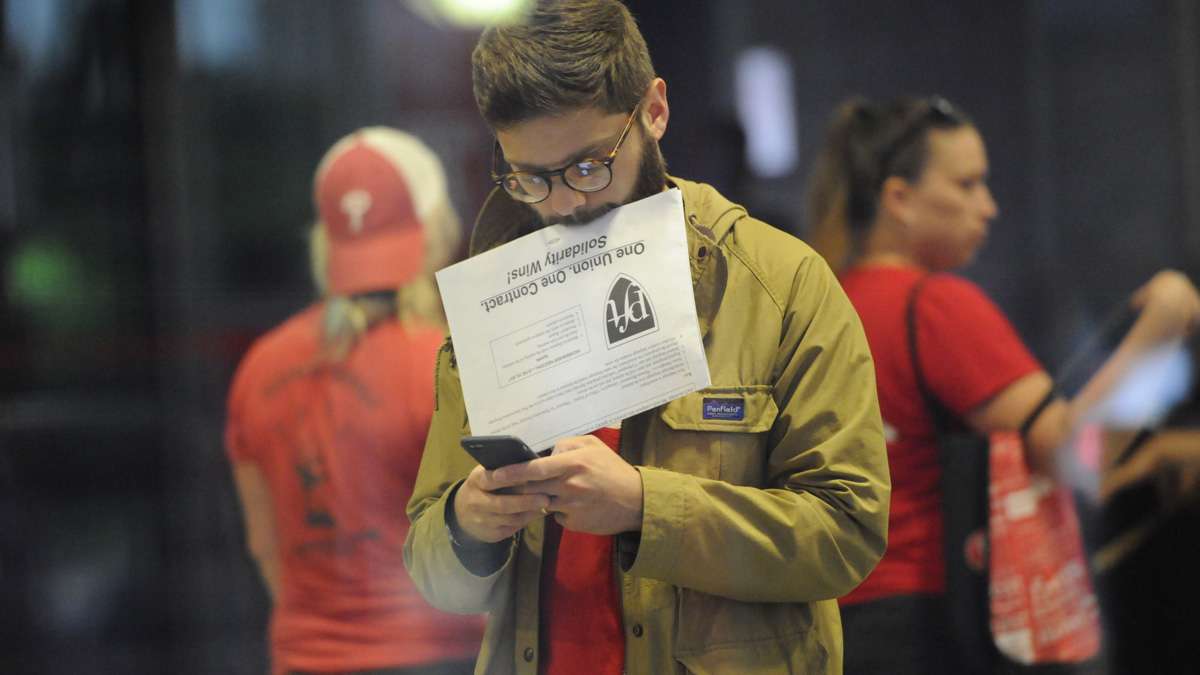
Teacher Joshua Kleiman checks his phone as he leaves the Liacouras Center after voting. (Jonathan Wilson for WHYY)
Philadelphia teachers ratified a new labor deal Monday night, all but assuring city educators of their first valid contract since the old pact expired four years ago.
The contract will go into effect if a majority of the five-member School Reform Commission approves it at a meeting scheduled for Tuesday. District sources expect the SRC to OK the deal, though there may be a dissenting vote or two.
Philadelphia Federation of Teachers president Jerry Jordan announced the vote at a press conference after the meeting concluded.
“We have a contract,” he said.
The vote, tallied by the American Arbitration Association, was overwhelming — 4,399 yes, and 213 no.
“We’re glad the contract is settled,” Jordan said. “We know it will bring stability to the School District of Philadelphia. The retention of teachers, I believe, will be much better because people will be able to plan their futures, and Philadelphia will be a place where we can recruit once again.”
The new contract runs through 2020 and is expected cost the School District of Philadelphia $395 million. It includes some retroactive pay and salary increases for union members, whose wages haven’t budged in almost five years. Even as they gained experience and, in some cases, earned advanced degrees, they did not receive increments.
Asked if he had any commitments from Mayor Jim Kenney or other city officials for additional funds to help pay for it, Jordan said he did not.
“There was never ever a time I can remember when a contract has been settled where there has been a boatload of money waiting to pay for [it],” Jordan said. “We have to rely on our funders in state as well as the city.”
The compensation package does not, however, cover all money lost during the protracted negotiations between district officials and the teachers union; the teachers hardest hit were those with between five and eight years in the district.
Jess McRae, a ninth-year teacher from the Feltonville School Arts and Science, estimated she’d lost out on $20,000 due to missed step increases and the fact that she’s not yet been compensated for the master’s degree she recently earned.
“When things froze, I was kind of at the step in my life where I’d just gotten married, just bought a house, having my first kid,” McRae said. “So it wasn’t great.”
‘Our voices have been heard’
The new contract also allows principals to hire teachers irrespective of their seniority, all but abolishing a practice that district officials have been slowly chipping away at for years.
The Philadelphia Federation of Teachers — whose 11,000 members include teachers, counselors, and other school staff — approved the deal by ballot Monday evening at Temple University’s Liacouras Center.
Many teachers said Monday they were voting “yes” because they felt the deal presented was as good as they could reasonably expect given the district’s perpetually precarious fiscal situation.
“We know that the city we live in, the money’s not there, the funds aren’t there, but I think that our voices have been heard over the past few years,” said Janine DeFuria, who teaches at J. Hampton Moore in Northeast Philadelphia. “And we’re just very happy with the outcome.”
Christostomos Argerakis, who teaches music at Andrew Jackson Elementary School in South Philadelphia, called the contract not ideal, but fair. He took a second job to make ends meet while the stalemate dragged on; at the same time, he conducted rehearsals and took the band he started at the school on their gigs largely on his own time.
Thinking he would have to leave the district if a new contract weren’t in place by September, Argerakis said that now, “I have every intention to stay.”
“I do feel relieved,” he said.
Joy Lewis, a teacher at the Andrew Morrison School in Olney, said she was excited about the new contract. Having taught at private and charter schools, Lewis said pay and benefits were far better in Philadelphia public schools.
“Sometimes you don’t always get what you want, but you better be grateful for what you can get,” she said. “Not accepting the contract can be worse.”
Michelle Lewis, who teaches at Francis Hopkinson School in Juniata, sounded a similar note.
“We didn’t have anything. [District officials] weren’t giving us anything,” said Lewis. “The offer we have now [PFT President] Jerry [Jordan] fought hard for. We can’t have everything.”
Future financial concerns
Monday’s vote likely concludes a half-decade stalemate that strained relations between the district and its workforce while threatening to undo the progress made since a series of financial crises between 2012 and 2014 nearly bought Pennsylvania’s largest school system to its knees.
The question now is whether the district can avoid another fiscal calamity.
Philadelphia’s public school system already faced daunting long-term deficits because of growing charter and pension payments. Layer a new labor deal on top of that, and the district could be roughly a billion dollars in the red by fiscal year 2022 unless it gets additional funds. Current projections, which included $150 million for a new contract, foresee a $700 million shortfall in five years.
No matter what, the district will need help from its two main funders — the city and state governments — to cover the coming shortfall. A gaggle of city leaders — including Kenney and City Council President Darrell Clarke — released statements Friday praising the deal.
Steve Miskin, spokesman for the Pennsylvania House Republican caucus and press secretary to House Majority Leader Mike Turzai, didn’t hold out hope for much help from Harrisburg to help pay for the pact. “It will be hard to take any request from Philadelphia seriously given they do nothing to help themselves,” he said.
Concessions on both sides
The district and union each made significant compromises in the new collective bargaining agreement. The district abandoned its push for longer school days and incentive pay for teachers working in hard-to-staff schools or subjects. It also failed to eliminate the PFT’s Health and Welfare Fund, which provides services including prescriptions, dental and vision benefits. It did, however, somewhat scale back payments to the fund.
The new contract awards teachers already at the top of the salary scale a 3 percent lump sum payment immediately following ratification; a 4 percent lump sum payment in September; a 4 percent lump sum payment in 2018; and a 2 percent lump sum increase combined with a 2 percent salary increase in 2019.
Meanwhile, younger teachers who were still moving up the union’s salary ladder will jump an additional salary step in 2019 to partially make up for steps missed while salaries were frozen. They will also get money for earning additional degrees and graduate credits. Those increments had also been stopped, and some teachers had gone back to school on their own dime with the expectation of higher pay.
The union, meanwhile, made concessions on health insurance contributions and the role of seniority in teacher placement.
Under the new deal, union members will contribute 1.25 percent of their base salary toward their health premiums. In 2019, that contribution jumps to 1.5 percent. There will also be a surcharge for spouses of union members who are eligible for insurance through their employers, but opt to join the PFT plan.
In the past, union members didn’t contribute toward their health insurance coverage.
Other notable features of the pact:
- The district wanted to lengthen the school day and year; they will remain the same but a panel will be study the work day and propose changes that would take effect in the 2019 school year.
- The pact requires all staff to get training in restorative practices, a positive rather than punitive approach to student discipline.
- The maximum class size — 30 in grades K-3 and 33 in grades 4-12 — remains the same.
Despite a fierce summer rainstorm, scores of teachers poured into Temple University’s Liacouras Center, where the vote was held. Some arrived together on yellow school buses, crammed into the seats usually filled by their students. Almost all wore red, the PFT’s primary color.
Though the mood seemed buoyant, frustration wasn’t far below the surface. Teachers spoke openly of the disrespect and financial pinch they felt during their four-year wait for a contract.
Many said this deal will go part of the way toward repairing their relationship with district brass.
“Teachers must be valued and respected, and I think this contract makes inroads towards doing that financially and psychologically,” said Matthew Mandel, a teacher at Baldi Middle School in Northeast Philadelphia and a member of the PFT executive committee.
Kristen Luebbert, the PFT building representative at Bache-Martin Elementary School in Fairmount and a member of the Caucus of Working Educators, said she was “conflicted” because so many teachers in her building had between four and eight years’ experience. They will never get back their “step” increments and money they lost over the past four years.
“I have empathy for them,” she said. “I’m at the senior career teacher level, so it doesn’t affect me as much. It may have been the best offer, but these people have sacrificed for years.”
Most said they were voting for the contract anyway, feeling “between a rock and a hard place.”
Luebbert said that the meeting where members questioned the leadership was tame, with only a handful posing questions before discussion was closed. Someone made a motion for closure, and it was approved, although there were still people lined up at the mike.
“Many people were disappointed that we didn’t get a chance to ask more questions concerning the contract to Jerry directly,” said George Bezanis of the Caucus of Working Educators, which did a detailed analysis of the contract.
On the contract, Bezanis said he voted reluctantly “yes.”
“It was a war of attrition, the best deal we will get,” Bezanis said. “This was the bare minimum I would vote for.”
WHYY is your source for fact-based, in-depth journalism and information. As a nonprofit organization, we rely on financial support from readers like you. Please give today.


